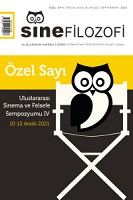Yürümek Bir Devrimdir: Henry David Thoreau’nun Yürümeye Dair Felsefesi ile Heraklitos’un Ateşe Atfettikleri Bağlamında The Way Filmi
Walking is a Revolution: The Way in the Context of Henry David Thoreau’s Philosophy of Walking and Heraclitus’ Attributes to Fire
Author(s): Berceste Gülçin ÖzdemirSubject(s): Aesthetics, Ancient Philosphy, 19th Century Philosophy, Film / Cinema / Cinematography, Sociology of Art
Published by: Serdar Öztürk
Keywords: Walking; natüre; fire; exitence; dialectic; film philosophy;
Summary/Abstract: Walking is an act that has been attached importance by philosophers and thinkers for centuries. Walking is in close connection with nature, and it has revolutionary qualities with the possibilities it offers to human beings in their search for meaning. Based on this framework and questionings, the monologues of the main character (Tom) in the movie The Way (Emilio Estevez, 2019), his dialogues with other characters, his relationality with the concepts of walking and journey in the distance he established with life, are discussed with the dialectical method Socrates based his questionings on. In many of the works of Henry David Thoreau, the shocking importance of walking is presented to readers in different contexts for them to think about it again. This study, within the framework of the discourses that constitute Thoreau’s philosophy on walking, questions situations such as the close relationship of nature with human beings, the effort of humans to make sense of life while walking, and the facts related to these situations, together with the concept of journey. The importance attributed to the element of fire by Heraclitus, one of the natural philosophers, draws the framework of the study in the context of the immanence of human existence to nature under these questionings. With the questions it reveals and the ideas it discusses, the study allows other questions to be asked and provides the progress of the discussed ideas, and these ideas are presented with the answers that emerge. Thus, by accessing the existing questioning issues in the focus, the study provides an opportunity to reveal and discuss the issues in its focus. While applying this method, the study aims to return to the essence of speech, which constitutes the essence of the dialectical method, based on Socrates’ sentence “I know that I know nothing”, to reach this situation, and also to enable the development of questionings that emerge outside the study. Also, the questioning of Thoreau’s thoughts on walking and nature and Heraclitus’s thoughts on the element of fire with the dialectical method carries integrity and significance in itself
Journal: SineFilozofi
- Issue Year: 7/2022
- Issue No: Sp. Iss.
- Page Range: 2-24
- Page Count: 23
- Language: Turkish

